Emotional Intelligence in an AI World Part 4 (Final Part)
May 22, 2025
Part 4: Slow Down to Power Up: The Long Game of Emotional Intelligence
The other night, as my son and I were winding down for bed, he asked, “Why do you always ask how I’m feeling instead of just if I had a good day?” I smiled, tucked him in a little tighter, and said, “Because how you feel tells me more about your world than anything else.”
We live in a culture that celebrates productivity, instant gratification, and measurable outcomes. Faster is better. Efficient is king. “Did you get it done?” often matters more than “How did that feel?” But emotional growth doesn’t follow a straight line. It’s messy, nonlinear, and deeply human.
And yet, that’s the road we’ve chosen to walk in our home — on purpose.
The World Says 'Speed Up' — We're Choosing to Slow Down
As a coach, I see the urgency so many parents and educators feel. They want results. They want behavior to change overnight. They want to fix what’s wrong. But when it comes to emotional intelligence, there are no shortcuts. No AI solution. No plug-and-play formula.
What EQ asks of us — especially as adults raising kids — is to slow down enough to notice. To pause before we speak. To stay curious when our kids act out instead of rushing to discipline. To reflect on our reactions instead of justifying them.
That’s the long game. And it’s worth it.
Why Emotional Intelligence Takes Time
Unlike a new app update or AI-generated answer, emotional growth requires repetition, reflection, and real-life messiness. A child learns empathy because we showed it to them, consistently. They learn self-regulation because we held boundaries and held space when they were struggling.
In our home, we have hard days. I lose my temper sometimes. My son tests limits. But through it all, we come back to connection. We name feelings. We apologize. We try again.
That’s EQ in action. It’s not clean. It’s not fast. But it’s real — and it’s lasting.
The Future We’re Building
I often think about the kind of adult I hope my son becomes. Not just what job he’ll have or how well he performs, but who he is when life gets hard. Will he know how to reach out instead of shut down? Will he be able to hold both his own story and someone else’s with grace? Will he trust his own inner compass?
That’s why we’re prioritizing EQ. Not because it’s trendy — but because it builds a foundation that AI will never be able to replicate: self-awareness, empathy, resilience, and human connection.
1 Family Practice to Try This Week:
"Pause + Name" Moments
Next time your child is upset, or you’re feeling overwhelmed, pause and say what’s happening inside. For example:
- “I’m noticing I’m feeling frustrated because things are so loud right now.”
- “It seems like you’re disappointed. Want to talk about it?”
By naming the emotion, you’re helping your child build emotional vocabulary — and modeling regulation in real time.
The Bottom Line
Raising emotionally intelligent kids isn’t flashy. It won’t always give you quick wins or perfect Instagram moments. But it’s revolutionary in its own way. In a world obsessed with speed and efficiency, choosing to slow down, feel deeply, and connect with intention? That’s power. That’s leadership. That’s love.
We’re not raising robots. We’re raising humans. And that will always matter most.
Stay connected with news and updates!
Join our Newsletter list to receive the latest news and updates from our team.
Don't worry, your information will not be shared.
We hate SPAM. We will never sell your information, for any reason.

